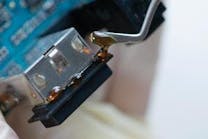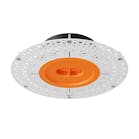Shin-Etsu develops high-thermally conductive eletronic soft-pad silicones
Sept. 17, 2010
Date Announced: 17 Sep 2010 Akron, OH - Developed to countermeasure against heat emanation generated by electronic devices, Shin-Etsu Silicones of America, Inc. (A U.S. subsidiary of Shin-Etsu Chemical Co. Ltd., Japan), has recently launched its TC-CA Series. Comprised of Shin-Etsu’s advanced polymer and thermally conductive filler composite material technologies, the low-hardness silicone “soft pad” series of products have both high thermal conductivity and excellent electrical insulation properties.The TC-CA Series also offers excellent cost-performance that meets the growing need for thinner and lighter weight electronic device applications such as those mounted in notebook PCs, LED lighting, hybrid cars and electric cars, etc. Additionally, the “soft pad” materials allow better line-to-line contact between the heat sink and the heat generating component which means more heat transfer−which equates to longer life parts.Compared to conventional products, the new silicone soft pad product series offer a unique combination of advanced polymer and thermally conductive filler composite material properties including:TC-CA SERIES PRODUCTS/PROPERTIES: TC-CAS, TC-CAB, TC-CAD, TC-CAT▪ Low-hardness that makes for good compressibility▪ Stress-relaxation property that can reduce stress to heat modules▪ Excellent workability and processibility▪ Low specific gravityThese heat-dissipating thermal interface materials are thermally conductive compounds fitted between the heat-generating unit; such as a computer’s CPU, and the heat sink. Depending on the application, it is possible to meet diverse heat-dissipation requirements as each product in the series offers a combination of unique properties from which customers can choose the most appropriate product based on specific application or usage conditions.According to Shin-Etsu’s North America Marketing Manager Eric Bishop, “The TC-CA series meets the expanding demand for a thermally conductive solution for heat-dissipation applications in the growing number of electronic components in automobiles and LEDs−as well as in PCs, home appliances, and electronic game units. Moreover, due to the increasing miniaturization and higher performance of electronic devices, the need for more effective heat-dissipation materials is further increasing.”Bishop also noted that in addition to the TC-CA “soft pad” series, Shin-Etsu has a line-up of various thermally conductive silicone materials including; insulating rubber, phase-change materials, two-sided adhesive tapes, greases, gels and adhesive agents. Bishop concluded in stating, “Shin-Etsu is continuing to advance product development to meet even more of the sophisticated needs of this growing market.”
Contact
Ray Farrar Method Media LLC (216) 861-0862
E-mail:[email protected]






